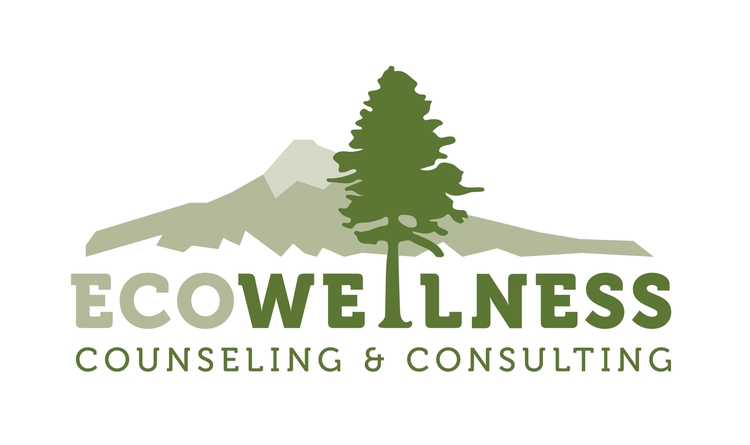2021 Science Pub Talk on EcoWellness
The Development and Research Base of EcoWellness
Some helping professionals focus on psychopathology as the basis for working with clients. Typically, you as the client are diagnosed with a mental health disorder, and you and the professional work together to "fix" the symptoms of the diagnosis. We acknowledge the utility and importance of psychopathology, yet also strongly believe that clients are holistic beings (Myers, 1991). We work from what's called a wellness perspective where wellness is considered the integration of mind, body, and spirit where the "whole" is considered greater than the sum of its parts (Myers & Sweeney, 2008). There are many different parts of us. We work, we play, we create, we think, we feel, we are spiritual, we are social, we are physical--we are many things! Let's say we lose an important relationship in our lives, whether it be through death or breaking off a relationship. All other aspects of our lives are impacted. We may lose sleep, we may feel depressed, we may adjust our eating habits to cope, we may begin using different substances, and we may begin questioning aspects of our spiritual identities. Thus, one purpose of counseling is to identify different aspects of health that may be suffering and identify other areas where health is thriving (i.e., strengths) as to help the individual or family create a plan in pursuit of a sustainable wellness.
There are several wellness models in counseling and other disciplines, of which there is no mention of nature. This seems odd given a breadth of research supporting nature's impacts on wellness. We consider nature as the intentional direct or indirect engagement of non-human species or living systems. Meaning, nature is self-defined and depends on one's level of engagement with a non-human entity. For example, when you play with your dog, you are experiencing nature! When you walk outside and ignore the trees around you and instead focus on your ipod music and concrete in front of you, we would argue that you are not experiencing nature. Some folks argue that there are different kinds of nature or "wildness" (Cookson, 2011), but we strongly believe that nature should be self-defined. Intentional uses of nature have been shown to help us refocus and experience restoration (Kaplan & Kaplan, 1989), reduce stress in our lives (Park et al., 2010), more quickly recover from surgery (Ulrich, 1984), enhance connection with others (Wakefield et al., 2007), promote the experience of spirituality (Unruh & Hutchinson, 2011), and reduce ADHD symptomology (Faber Taylor & Kuo, 2011). Brain researchers using mobile EEG have also shown that walking in a green setting (i.e., a park) is associated with brain levels indicating lower frustration, engagement, and arousal, and high levels of meditation relative to walking through a busy commercial street and a shopping street (Aspinall et al., 2013). Nature can do a lot for us! And, through a healthy relationship with different aspects of nature we believe we can also do a great deal of good for aspects of nature and natural settings.
Given the gap in wellness models, Ryan developed the concept of EcoWellness during his graduate studies, which serves as a foundation for our company’s exploring the role of nature in counseling processes. EcoWellness is the perceived sense of wellness one experiences through their connection with nature. Ryan developed an assessment (the Reese EcoWellness Inventory) during his doctoral studies and tested aspects of its validity and reliability. Through an expansive literature review, he proposed that there are many aspects of EcoWellness, including access, environmental identity, and the experience of transcendence. Through a large random sample of participants, Ryan found that there were seven aspects of EcoWellness in particular:
Physical Access
Sensory Access
Connection
Protection
Preservation
Spirituality
Community Connectedness
Ryan found that EcoWellness is, in fact, related and predictive of an evidence-based wellness model in counseling (the Indivisible Self Model of Wellness; Myers & Sweeney, 2008). Whether one has access to nature, experiences connection to it, utilizes nature in their life and feels passionate about an environmental cause, experiences a greater sense of closeness to one's life guiding principles and to others all seem to positively impact perceived wellness.
All of the original peer-reviewed articles cited above can be found below. Also included is the original article published on EcoWellness (Reese & Myers, 2012) that includes a case example of how EcoWellness can be used with clients and a PDF copy of Ryan’s dissertation. If you have any questions at all about EcoWellness and the research underlying the concept please feel free to email us. EcoWellness serves as a helpful and evidence-based model for clients and practitioners to think about as they consider how to promote wellness through exposure to nature.
Linked Articles
EcoWellness Article: Including a Case Example
Ryan Reese EcoWellness Dissertation
Definition of Wellness Counseling

